|
The 6th World Congress on
Controversies in Neurology (CONy)
Vienna, Austria, March 8-11, 2012 |
|
 |
| |
| About Vienna |
 |
|
|
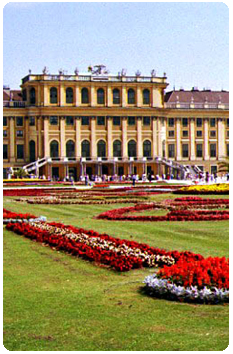 Vienna, described as Europe's cultural capital, is a metropolis with unique charm and flair. Wander along narrow, medieval alleyways or across imperial squares, view Schönbrunn Palace and the Imperial Hofburg Palace in the footsteps of Sisi and Emperor Franz Joseph, and marvel at the majestic architecture along the Ringstrasse. Vienna, described as Europe's cultural capital, is a metropolis with unique charm and flair. Wander along narrow, medieval alleyways or across imperial squares, view Schönbrunn Palace and the Imperial Hofburg Palace in the footsteps of Sisi and Emperor Franz Joseph, and marvel at the majestic architecture along the Ringstrasse.
Known as the city of art and culture, Vienna has been synonymous with music for centuries, and home to Mozart, Beethoven, Schubert and Johann Strauss. This outstanding heritage has been carefully preserved until today - the Vienna Philharmonic Orchestra and the Vienna Boy's Choir, to name but two, are known all over the world.
Along with its renowned history in music, Vienna possesses a vast array of cultural attractions, from classical or experimental theatre to film or dance festivals, opera or operetta, exhibitions or concerts. Throughout the centuries, the city has always produced and nurtured world-famous artists. The collecting passion of art-loving rulers and monarchs has made Vienna a treasure house par excellence. The Museum of Fine Arts, for instance, is one of the world's largest and most distinguished museums.
Even some of the city's underground stations are listed properties due to their elegant, ornamental Jugendstil design.
Enjoy the splendor of this truly unique city and be inspired by an atmosphere steeped in history and culture!
|
|
Vienna Attractions
Places
Schönbrunn Castle 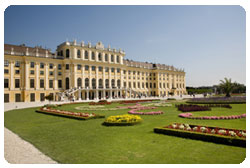 The festively illuminated Schoenbrunn Palace, the former summer residence of the Austrian Emperors, provides a spectacular backdrop for an idyllic Christmas village full of the scent of mulled wine and ginger bread. And almost every day, festive concerts spread Christmas mood! The festively illuminated Schoenbrunn Palace, the former summer residence of the Austrian Emperors, provides a spectacular backdrop for an idyllic Christmas village full of the scent of mulled wine and ginger bread. And almost every day, festive concerts spread Christmas mood! |
Rathausplatz 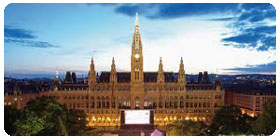 The Rathausplatz is a building in Vienna which serves as the seat both of the mayor and city council of the city of Vienna. The town hall also serves, in personal union, as Governor and Assembly (Landtag) of the State of Vienna, a state with the Austrian federal system. The Rathausplatz is a building in Vienna which serves as the seat both of the mayor and city council of the city of Vienna. The town hall also serves, in personal union, as Governor and Assembly (Landtag) of the State of Vienna, a state with the Austrian federal system. |
Vienna Opera House 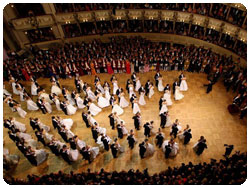 The Vienna State Opera (Wiener Staatsoper) is an opera house – and opera company – with a history dating back to the mid-19th century. It is located in the centre of Vienna, Austria. It was originally called the Vienna Court Opera (Wiener Hofoper). In 1920, with the replacement of the Habsburg Monarchy by the First Austrian Republic, it was renamed the Vienna State Opera. The members of the Vienna Philharmonic are recruited from its orchestra. The Vienna State Opera (Wiener Staatsoper) is an opera house – and opera company – with a history dating back to the mid-19th century. It is located in the centre of Vienna, Austria. It was originally called the Vienna Court Opera (Wiener Hofoper). In 1920, with the replacement of the Habsburg Monarchy by the First Austrian Republic, it was renamed the Vienna State Opera. The members of the Vienna Philharmonic are recruited from its orchestra. |
Viennese Cuisine
Wiener Schnitzel 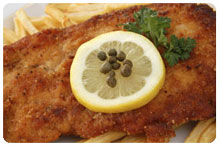 The Wiener Schnitzel is a traditional Austrian dish consisting of an escalope coated in breadcrumbs and fried. The Wiener Schnitzel is a traditional Austrian dish consisting of an escalope coated in breadcrumbs and fried. |
Sachertorte (Sacher cake) 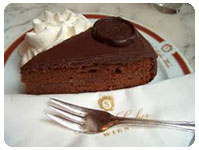 The Sachertorte (Sacher cake) is a chocolate cake. It was invented by chance by Jewish Austrian Franz Sacher in 1832 for Klemens Wenzel von Metternich in Vienna, Austria.[1] It is one of the most famous Viennese culinary specialties. The Original Sachertorte is only made in Vienna and Salzburg, and it is shipped from both locations. The only place where the Original Sacher Torte is available outside of Austria is in the Sacher shop of Bolzano (Bozen), Italy. The Sachertorte (Sacher cake) is a chocolate cake. It was invented by chance by Jewish Austrian Franz Sacher in 1832 for Klemens Wenzel von Metternich in Vienna, Austria.[1] It is one of the most famous Viennese culinary specialties. The Original Sachertorte is only made in Vienna and Salzburg, and it is shipped from both locations. The only place where the Original Sacher Torte is available outside of Austria is in the Sacher shop of Bolzano (Bozen), Italy. |
|
Famous Austrian People
|
Sigmund Freud (1856 - 1939)  Freud person is bound to be mentioned sooner or later whenever psychology is discussed. Even when his name is not cited, his ideas and terminology are frequently referred to. Terms such as ”Oedipus Complex” and ”repression”, for example, are today general knowledge. Freud person is bound to be mentioned sooner or later whenever psychology is discussed. Even when his name is not cited, his ideas and terminology are frequently referred to. Terms such as ”Oedipus Complex” and ”repression”, for example, are today general knowledge.
Born in 1856 in Freiberg in northern Moravia, he studied medicine before graduating from Vienna University in 1881. Together with Josef Breuer, he developed a procedure to treat psychic disorders through the discharge or catharsis of repressed traumatic experiences. This represented a first step towards the method of psychoanalysis, which he was later to develop. His best-known work is The Interpretation of Dreams. In Vienna, his former practice has been converted into a museum. |
Wolfgang Amadeus Mozart (1756 - 1791)
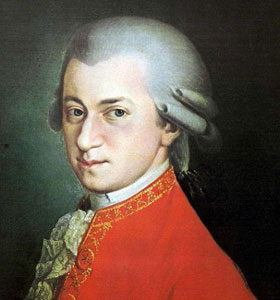 Wolfgang Amadeus Mozart was born in 1756 in Salzburg and was already considered a genius as a child. He made his first attempts at composition at the tender age of six. He was the son of a violin instructor, court composer and deputy music director at the court of the prince-archbishop of Salzburg and is one of the greatest composers of all times. Wolfgang Amadeus Mozart was born in 1756 in Salzburg and was already considered a genius as a child. He made his first attempts at composition at the tender age of six. He was the son of a violin instructor, court composer and deputy music director at the court of the prince-archbishop of Salzburg and is one of the greatest composers of all times.
He created twenty-four operas including such famous works as The Magic Flute, Don Giovanni and The Marriage of Figaro, seventeen masses, and over fifty symphonies. His work, however, extended to all styles and types of music. He knew how to blend traditional and contemporary elements to create his own distinctive style, which is characterized by thematic and tonal variety melded with a high degree of formal discipline. His compositions live from their melodic, rhythmic and dynamic contrasts. He moved to Vienna in 1781, where a year later he married the singer Constanze Weber. In 1787 he was appointed court chamber composer. He died in 1791 while working on his famed requiem. |
Arnold Schwarzenegger (born 1947)
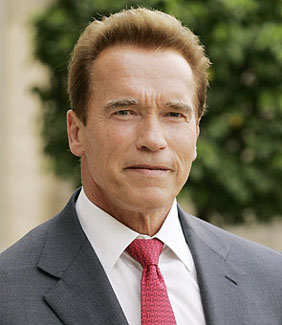 Arnold was born in 1947 in Thal, Austria, a small village bordering the Styrian capital Graz. Arnold was born in 1947 in Thal, Austria, a small village bordering the Styrian capital Graz.
He began weight-training at fifteen and was awarded the title of Mr. Universe at age 22 and went on to win the Mr. Olympia contest a total of seven times. He has remained a prominent face in the bodybuilding sport long after his retirement, and has written several books and numerous articles on the sport.
In 1968, at the age of 21, he moved to the United States 21 where his now legendary career in film started.
He is currently serving as the 38th Governor of California. |
|
|
|
|